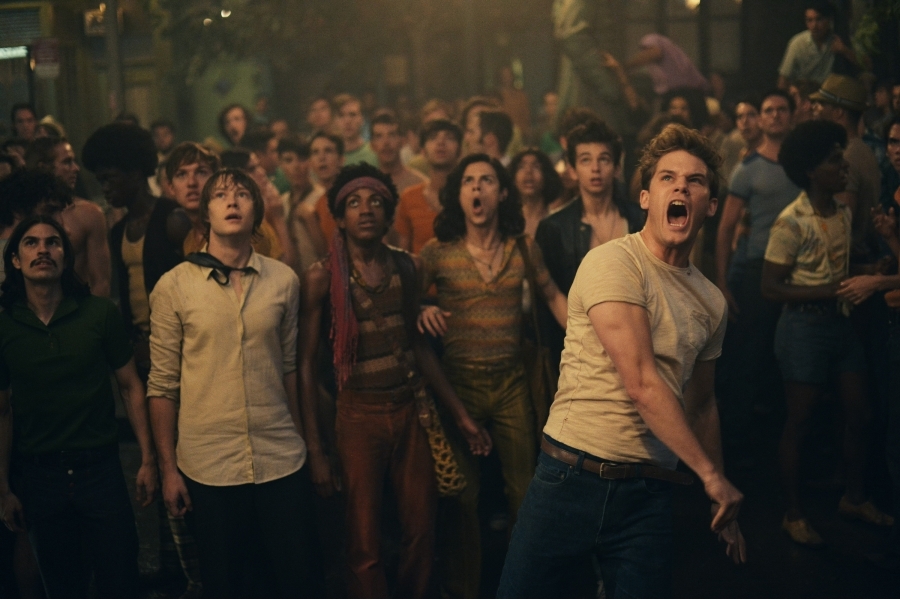Out filmmaker Roland Emmerich’s “Stonewall,” opening at the Ritz East theatre Sept. 25, is more ambitious than good. In fact, at times it is not even particularly good, but downright cringe-inducing.
Written by gay playwright Jon Robin Baitz, the film sets the stage by using captions to describe what LGBT life was like on June 28, 1969, when the riots took place. To wit, federal law prohibited the government from hiring homosexuals, homosexuality was classified as a mental illness, treatment often involved electroshock therapy and it was illegal for homosexuals to congregate in public where alcohol was served (and cops often raided such bars in an effort to put them out of business).
“Stonewall” opens with scenes of the riot, in which members of the LGBT community rose up in protest against the police harassment. The film then goes back in time to tell a fictional narrative involving Danny (Jeremy Irvine), a handsome, blonde gay boy from Indiana, arriving in New York with hopes of attending Columbia. He has, as flashbacks reveal, been kicked out of his home after he is caught giving a blowjob to Joe (Karl Glusman), a classmate he loves but who doesn’t love him back.
Now homeless, on Christopher Street in New York City, Danny meets Ray (Jonny Beauchamp), a feisty Puerto Rican who turns tricks and ekes out a life on the streets, sleeping on the floor with a dozen others in a flophouse. Ray’s friends include Cong (Vladimir Alexis), Orphan Annie (Caleb Landry Jones), Quiet Paul (Ben Sullivan) and Marsha P. Johnson (Otoja Abit). Cong provides much of the film’s didactic moralizing, with comments about taking what he wants — as he pulls down hotel curtains to make a dress — because if “If I didn’t, I’d have nothing.” The film explains that these characters have “nothing to lose,” which is why they riot.
Danny (and by proxy audiences) soon becomes educated about gay life in general, and in New York City in particular. The naïve young Midwestern discovers the trucks in the meatpacking district where men have anonymous sex, only to get beaten up by a pair of cops during a raid. Ray later takes Danny to the Stonewall Inn bar, where gay life thrives under the watchful eye of Ed Murphy (Ron Perlman), the bar’s manager, who is wanted by Deputy Seymour Pine (Matt Craven).
It is at the bar where Danny meets and falls for Trevor (Jonathan Rhys Meyers), a writer who is involved with the Mattachine Society. This makes Ray jealous. Other subplots introduce gay-rights activist Frank Kameny (Arthur Holden), and a straight couple in the neighborhood whowatch over the homeless youth. But one of the central problems with “Stonewall” is that it is too overstuffed with characters, plots and points that it never does its important story justice.
The film recounts key facts, such as how lesbian and trans patrons of the Stonewall Inn were arrested for wearing three articles of gender-inappropriate clothing. However, the multiple flashbacks to Danny’s life in Indiana undercut the developing tensions in New York. Regardless, the buildup of anger that Danny feels never resonates. When he shouts, “I feel like I want to break something!” it practically generates a laugh.
The supporting characters of gay street urchins, with the notable exception of Ray, barely register. They play into cookie-cutter stereotypes, debating Judy Garland versus Barbra Streisand, rather than becoming real characters.
“Stonewall” is as much about gay pride (and shame) as it is acceptance and equality. But this is emphasized more in a cloying storyline involving Danny trying to make amends with his family and Joe back in Indiana than in the fight against oppression that unfolds at the title establishment. Baitz and Emmerich have put the emphasis on the wrong syllable.
Too much of the film lacks authenticity, or even creativity. A scene of Danny getting paid by a stranger for oral sex could have made a clever visual reference to Andy Warhol’s “Blow Job.” Instead, Emmerich includes a peculiar episode where Danny is kidnapped and presented for oral sex to a heavyset older man in bad drag who quotes the Bible. It is as embarrassing as it is unnecessary.
“Stonewall” is not always so wrongheaded, but this well-intentioned film, which depicts the origins of gay liberation and radicalism, does feel like a missed opportunity. Irvine is certainly handsome as Danny, but he displays little emotional range. It is hard to get fired up about him feeling oppressed, because he always seems so innocent. In contrast, Beauchamp is outstanding as the world-weary Ray. Sashaying through the film with cockiness, Beauchamp is so good — especially when he curls up with Danny and confides his dream for a better life. One wishes the film were his story, not Danny’s. And in a sense, it is. In one of the film’s few nice touches, Emmerich dedicates “Stonewall” to the voices of the riot’s unsung heroes.
